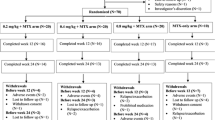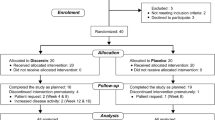Abstract
Background
Rheumatoid arthritis (RA) is a potentially destructive disease that may have a profound impact on patients’ function and quality of life. RA therapy is still a challenge for rheumatologists; however, new antirheumatic drugs may be a treatment option for disease-modifying antirheumatic drug (DMARD)-experienced patients with active RA.
Objectives
The present study is a prospective trial that aims to investigate the effects of therapy with iguratimod plus methotrexate (MTX) in comparison with iguratimod or MTX monotherapy in DMARD-experienced adult patients with active RA.
Methods
A total of 131 patients (24 men, 107 women, mean age 46.63 ± 10.61 years) with a history of being treated with traditional DMARDs were investigated. In all, 44 patients were treated with iguratimod (25 mg, twice daily, orally) plus MTX (a weekly dose of 10 mg, orally), 38 patients received iguratimod (25 mg, twice daily, orally), or 49 patients received MTX (weekly dose of 10 mg, orally) for 24 weeks.
Results
A therapeutic effect with iguratimod was observed between 4 and 10 weeks after treatment initiation and was effective even in patients who had a poor response to previous treatment with DMARDs. The combination of iguratimod with MTX was superior to iguratimod or MTX monotherapy.
Conclusion
The data imply that iguratimod is a welcome addition to the small-molecule drug therapy for DMARD-experienced patients with active RA. Iguratimod (alone or in combination with MTX) is an emerging option for the treatment of DMARD-experienced adult patients with active RA who have had an inadequate response to or are intolerant of other DMARDs.
Zusammenfassung
Hintergrund
Die rheumatoide Arthritis (RA) ist eine potenziell destruktive Erkrankung, die erheblichen Einfluss auf Funktionalität und Lebensqualität haben kann. Ihre Behandlung stellt nach wie vor eine Herausforderung dar, doch neue Antirheumatika sind möglicherweise eine Therapieoption für Patienten mit aktiver RA, die erfahren sind im Umgang mit DMARDs („disease-modifying antirheumatic drugs”) bzw. Basistherapeutika.
Ziele
Die vorgestellte Studie ist eine prospektive Untersuchung zur Erforschung der Therapieeffekte der Kombination Iguratimod plus Methotrexat (MTX) im Vergleich zu einer Iguratimod- oder MTX-Monotherapie bei erwachsenen, DMARD-erfahrenen RA-Patienten.
Methoden
Insgesamt 131 Patienten (24 Männer, 107 Frauen, Durchschnittsalter 46,63 ± 10,61 Jahre) mit einer traditionellen DMARD-Behandlung in der Anamnese wurden in die Studie eingeschlossen. Mit Iguratimod (25 mg, 2-mal täglich, oral) plus MTX (eine wöchentliche Dosis von 10 mg, oral) wurden 44 Patienten behandelt, mit Iguratimod (25 mg, 2-mal täglich, oral) 38 und mit MTX (wöchentliche Dosis, 10 mg, oral) 49, jeweils über 24 Wochen.
Ergebnisse
Zwischen 4 und 10 Wochen nach Beginn der Behandlung mit Iguratimod wurde eine therapeutische Wirkung beobachtet, Iguratimod war sogar effektiv bei Patienten, die zuvor auf DMARDs kaum angesprochen hatten. Die Iguratimod-MTX-Kombination erwies sich als den jeweiligen Monotherapien überlegen.
Schlussfolgerung
Die Daten implizieren, dass Iguratimod für DMARD-erfahrene Patienten mit aktiver RA eine willkommene Ergänzung zur Therapie mit kleinmolekularen Substanzen ist. Iguratimod (allein oder in Kombination mit MTX) kristallisiert sich heraus als Option zur Behandlung DMARD-erfahrener Patienten mit aktiver RA, die auf DMARDs nicht ausreichend ansprechen oder Unverträglichkeiten aufweisen.
Similar content being viewed by others
References
Hawtree S, Muthana M, Wilson AG (2013) The role of histone deacetylases in rheumatoid arthritis fibroblast-like synoviocytes. Biochem Soc Trans 41:783–788
Kaufmann J, Feist E, Roske AE et al (2013) Monotherapy with tocilizumab or TNF-alpha inhibitors in patients with rheumatoid arthritis: efficacy, treatment satisfaction, and persistence in routine clinical practice. Clin Rheumatol 32:1347–1355
Bykerk VP, Schoels MM (2013) Treatment strategies for early rheumatoid arthritis. Curr Opin Rheumatol 25:375–383
Mucke HA (2012) Iguratimod: a new disease-modifying antirheumatic drug. Drugs Today (Barc) 48:577–586
Liu DY, Lon HK, Wang YL et al (2013) Pharmacokinetics, pharmacodynamics and toxicities of methotrexate in healthy and collagen-induced arthritic rats. Biopharm Drug Dispos 34:203–214
Coury FF, Weinblatt ME (2010) Clinical trials to establish methotrexate as a therapy for rheumatoid arthritis. Clin Exp Rheumatol 28(5 Suppl 61):S9–S12
Goodman S (2010) Measuring methotrexate polyglutamates. Clin Exp Rheumatol 28(5 Suppl 61):S24–S26
Braun J (2011) Methotrexate: optimizing the efficacy in rheumatoid arthritis. Ther Adv Musculoskelet Dis 3:151–158
McWilliams DF, Kiely PD, Young A et al (2013) Baseline factors predicting change from the initial DMARD treatment during the first 2 years of rheumatoid arthritis: experience in the ERAN inception cohort. BMC Musculoskelet Disord 14:153
Smolen JS, Landewé R, Breedveld FC et al (2010) EULAR recommendations for the management of rheumatoid arthritis with synthetic and biological disease-modifying antirheumatic drugs. Ann Rheum Dis 69:964–975
Fiehn C (2010) Methotrexate transport mechanisms: the basis for targeted drug delivery and ß-folate-receptor-specific treatment. Clin Exp Rheumatol 28(5 Suppl 61):S40–S45
Weinblatt ME (2013) Methotrexate in rheumatoid arthritis: a quarter century of development. Trans Am Clin Climatol Assoc 124:16–25
Rath T, Rubbert A (2010) Drug combinations with methotrexate to treat rheumatoid arthritis. Clin Exp Rheumatol 28(5 Suppl 61):S52–S57
Ishiguro N, Yamamoto K, Katayama K et al (2013) Concomitant iguratimod therapy in patients with active rheumatoid arthritis despite stable doses of methotrexate: a randomized, double-blind, placebo-controlled trial. Mod Rheumatol 23:430–439
Fransen J, Riel PL van (2005) The disease activity score and the EULAR response criteria. Clin Exp Rheumatol 23(5 Suppl 39):S93–S99
Felson DT, Smolen JS, Wells G et al (2011) American college of rheumatology/European league against rheumatism provisional definition of remission in rheumatoid arthritis for clinical trials. Arthritis Rheum 63:573–586
Smolen JS, Landewé R, Breedveld FC et al (2014) EULAR recommendations for the management of rheumatoid arthritis with synthetic and biological disease-modifying antirheumatic drugs: 2013 update. Ann Rheum Dis 73:492–509
Hara M, Abe T, Sugawara S et al (2007) Efficacy and safety of iguratimod compared with placebo and salazosulfapyridine in active rheumatoid arthritis: a controlled, multicenter, double-blind, parallel-group study. Mod Rheumatol 17:1–9
Hara M, Ishiguro N, Katayama K et al (2014) Safety and efficacy of combination therapy of iguratimod with methotrexate for patients with active rheumatoid arthritis with an inadequate response to methotrexate: an open-label extension of a randomized, double-blind, placebo-controlled trial. Mod Rheumatol 24:410–418
Compliance with ethical guidelines
Conflict of interest. Z. Xia, J. Lyu, N. Hou, L. Song, X. Li, H. Lui state that there are no conflicts of interest.
All studies on humans described in the present manuscript were carried out with the approval of the responsible ethics committee and in accordance with national law and the Helsinki Declaration of 1975 (in its current, revised form). Informed consent was obtained from all patients included in studies.
Author information
Authors and Affiliations
Corresponding author
Rights and permissions
About this article
Cite this article
Xia, Z., Lyu, J., Hou, N. et al. Iguratimod in combination with methotrexate in active rheumatoid arthritis. Z Rheumatol 75, 828–833 (2016). https://doi.org/10.1007/s00393-015-1641-y
Published:
Issue Date:
DOI: https://doi.org/10.1007/s00393-015-1641-y




